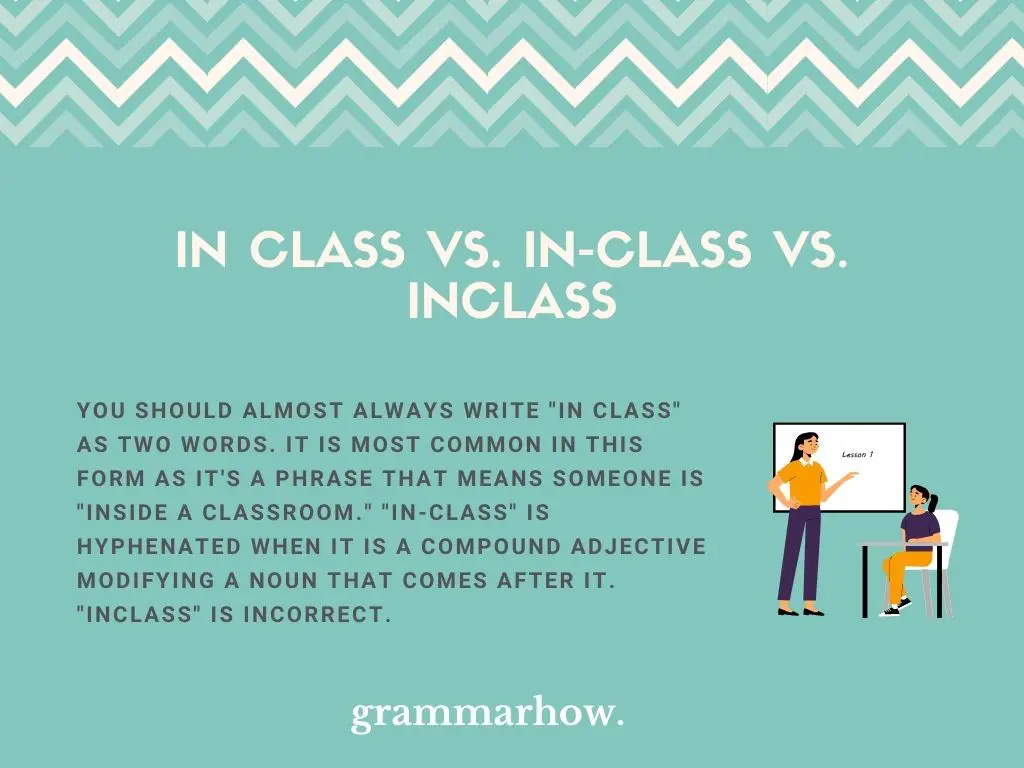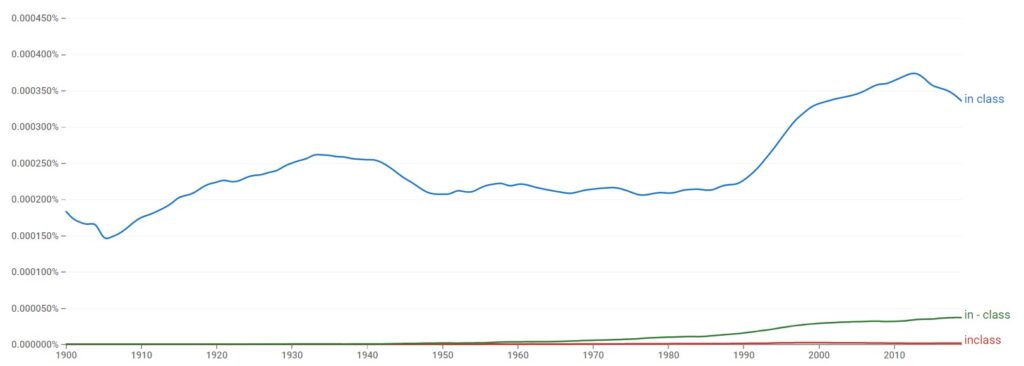It’s possible to write “in class” in a few ways. It would help to know whether it’s one or two words in most cases. You might also find that it’s hyphenated as “in-class.” This article will explain all the major forms you can use.
In class vs. In-class vs. Inclass
You should almost always write “in class” as two words. It is most common in this form as it’s a phrase that means someone is “inside a classroom.” “In-class” is hyphenated when it is a compound adjective modifying a noun that comes after it. “Inclass” is incorrect.

According to Google Ngram Viewer, “in class” is by far the most popular choice, showing that it’s the one you’re going to use the most. “In-class” isn’t as popular, but the line on the graph indicates that it’s still correct to use in this way.

Since “in class” is mainly used as a standard phrase, it does not need to be defined. Therefore, there are no appropriate entries to refer to in The Cambridge Dictionary or The Oxford Dictionary.
However, The Cambridge Dictionary does have an entry for “best in class” (close to what we’re looking for). It lists it as an adjective, showing that it only needs to be hyphenated when a noun comes directly after it.
Is “Inclass” One Word?
“Inclass” is never written as one word. You can only write it as two words or as a hyphenated adjective. It makes no sense. “Inclass” doesn’t look correct on a page and will sound jarring to most readers. You have got to establish a space or hyphen between the words.
These examples will show you how it looks when you use the correct form:
- Correct: I’m not the only one in class that’s going to be able to complete this.
- Incorrect: They all wanted to do it inclass, but I told them that we didn’t have the time for that.
- Correct: It’s going to be an in-class presentation. Can you handle that?
- Incorrect: I wanted to be the inclass representative, but nobody seemed to trust me with it!
Keep reading to learn if it’s really in class or at class.
Is “In class” Two Words?
“In class” is most commonly written as two words. It can be used as an adjective in this way, but it should not come directly before a word. You can also use “in class” as a general phrase that does not need to be grouped or hyphenated when used in a sentence.
Here are some examples to show you how to use “in class” in a sentence:
- I’m going to be in class for the time being. I really don’t feel like seeing anybody else today.
- She will be the one in class that’s going to get the furthest in life. You can trust me on that.
- We wanted to see what would happen in class. That’s why we decided to go in today.
- The presentations in class weren’t going as well as we had hoped. It really wasn’t fun to watch.
Is “In-class” Hyphenated?
You should hyphenate “in-class” when it appears in your writing before a noun. While it is always an adjective, the hyphenated form is only correct when a noun is directly modified. For example, you would say “the in-class entertainment.”
You should hyphenate “in” and “class” because of the rules established in the AP Stylebook. They teach us that two or more words should always be hyphenated when they are used to modify a noun. Since a noun comes after the adjective, the hyphen is required.
These examples will show you how to use “in-class” in a sentence:
- The in-class exams are always the hardest ones. It feels like we’re never quite ready for them.
- I’m not sure about doing the in-class presentations anymore. I really don’t want to make a fool of myself.
- I’m the in-class candidate for the president of this school. I’m hoping for the best.
- We are the best-in-class provider of this type of thing. You won’t find better quality elsewhere.
Is “Class” Capitalized In The Word “In-Class”?
Since “in-class” will only ever be hyphenated as an adjective before a noun, it rarely comes up at the start of a sentence. Therefore, you won’t need to worry about capitalizing either part of it. However, there is one case where “class” might be capitalized.
You can capitalize “Class” when it is included in a title. If your title style means you capitalize every word in your title, you should treat hyphenated words as separate words to help them fit into the style. “In-Class” would be correct in this title style.

Martin holds a Master’s degree in Finance and International Business. He has six years of experience in professional communication with clients, executives, and colleagues. Furthermore, he has teaching experience from Aarhus University. Martin has been featured as an expert in communication and teaching on Forbes and Shopify. Read more about Martin here.

